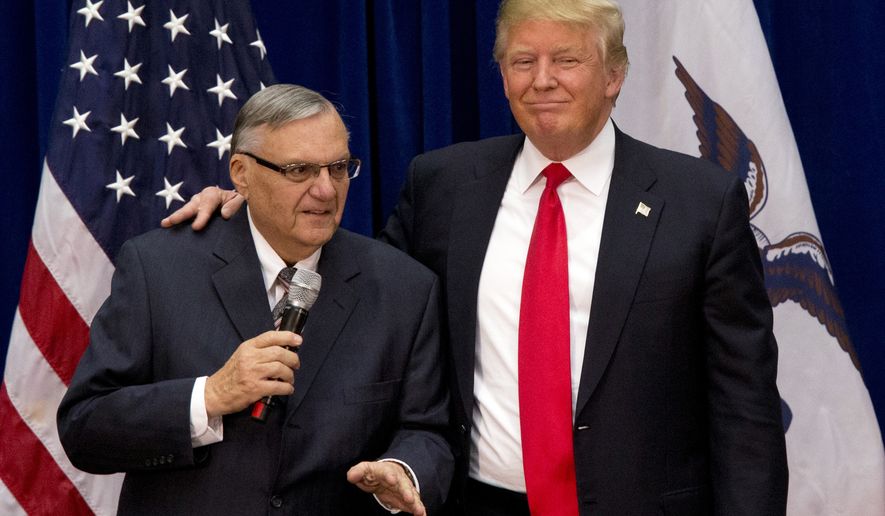President Trump issued the first pardon of his tenure Friday to former Maricopa County Sheriff Joe Arpaio, even before the lawman was sentenced for his conviction on a contempt of court charge.
The White House said Mr. Arpaio earned the pardon based on a lifetime of public service.
The former sheriff had been convicted by a federal judge who said Mr. Arpaio had ignored another judge’s order to halt traffic sweeps that identified illegal immigrants, turning them over to federal authorities for deportation.
His lawyers were still attempting to get the conviction tossed or to get a new jury trial, saying the first trial was unfair. The president’s move short-circuits those concerns.
“Arpaio’s life and career, which began at the age of 18 when he enlisted in the military after the outbreak of the Korean War, exemplify selfless public service,” the White House said, detailing Mr. Arpaio’s time as a police officer, an agent with the Drug Enforcement Agency, and eventually the six-term sheriff of Maricopa County in Arizona.
“Sheriff Joe Arpaio is now 85 years old, and after more than 50 years of admirable service to our nation, he is worthy candidate for a presidential pardon,” the White House said.
Mr. Arpaio had not asked for a pardon, but said he would accept one as a sign of his innocence.
Mr. Trump telegraphed the move earlier this month.
“So was Sheriff Joe convicted of doing his job?” Mr. Trump said at a rally in Phoenix Tuesday night to loud cheers. “You know what, I’ll make a prediction: I think he’s going to be just fine, OK? But I won’t do it tonight because I don’t want to cause any controversy. But Sheriff Joe should feel good.”
The pardon enraged immigrant-rights groups, who said it was an insult to the Hispanic community.
“A pardon for Arpaio is an endorsement of racism from the highest office in the land — signaling to Americans that discriminatory behavior and a blatant disregard for the judicial process is acceptable,” the National Association of Latino Elected and Appointed Officials said.
“This kind of act is an extraordinary intervention in our justice system that threatens the public’s faith in law enforcement and the rule of law,” the organization said.
Anger went beyond just immigrant-rights groups, however, to encompass the entire liberal alliance — including environmentalists, who said the pardon was a strike at the core of the Constitution.
“President Trump’s pardon continues his pattern of morally and politically bereft decision making, which comes as no surprise from an administration unable to rebuke white supremacy while working to build a xenophobic and environmentally dangerous border wall,” the League of Conservation Voters said.
The pardon will enrage immigrant-rights groups, who had said a pardon would be an insult to the Hispanic community.
Some groups had said any pardon would be viewed as a misstep by a president who was roundly criticized for his reaction to the clashes in Charlottesville earlier this month.
“If President Trump uses his power to pardon a discredited law enforcement official who persistently engaged in illegal racial profiling of the Latino community, it will not be a dog whistle to the so-called ’alt right’ and white supremacists, but a bull horn. No amount of tweets or forced remarks read from a teleprompter could undo the damage,” said Vanita Gupta, president and CEO of the Leadership Conference on Civil and Human Rights.
Polling had said Arizonans were against a pardon as well, but Mr. Trump had said he wanted to take care of Mr. Arpaio, a fellow Republican and one of the earliest and most forceful supporters of Mr. Trump’s presidential campaign.
Mr. Arpaio lost a bid for a seventh term in November, as immigrant-rights activists poured manpower into Arizona, determined to oust him.
They said Mr. Arpaio’s loss was some consolation to seeing Mr. Trump win both the state and the White House.
But Arpaio supporters had begged Mr. Trump to issue the pardon, and said he should go further and appoint the former lawman to a top border security post.
Mr. Arpaio was a centerpiece in the national immigration debate long before Mr. Trump entered the political scene. The then-sheriff harnessed his department to try to crack down on illegal immigrants, including using traffic stops to identify and detain illegal immigrants.
A federal judge in 2011 issued an order that appeared to demand the traffic stops be halted, but the the judge found that the sheriff continued them anyway. The judge referred the case to the Obama Justice Department, which announced it would pursue the case — just as voting was beginning ahead of last year’s election.
This year, Judge Susan Bolton found Mr. Arpaio guilty of willfully ignoring the other judge’s order.
Mr. Arpaio’s legal team said the conviction was a miscarriage of justice, based on out-of-context snippets of testimony that, when put in context, made clear Mr. Arpaio did not intend to break the court’s order.
“If a lawyer were to selectively cite quotes in the manner this court did, that manner would be subject to the wrath of the court, sanctions and contempt himself. That’s how outrageous the selective citations were by the trial court in rendering its baseless verdict,” Mark D. Goldman, one of Mr. Arpaio’s lawyers, told The Washington Times last week.
• Dave Boyer can be reached at dboyer@washingtontimes.com.
• Stephen Dinan can be reached at sdinan@washingtontimes.com.




Please read our comment policy before commenting.